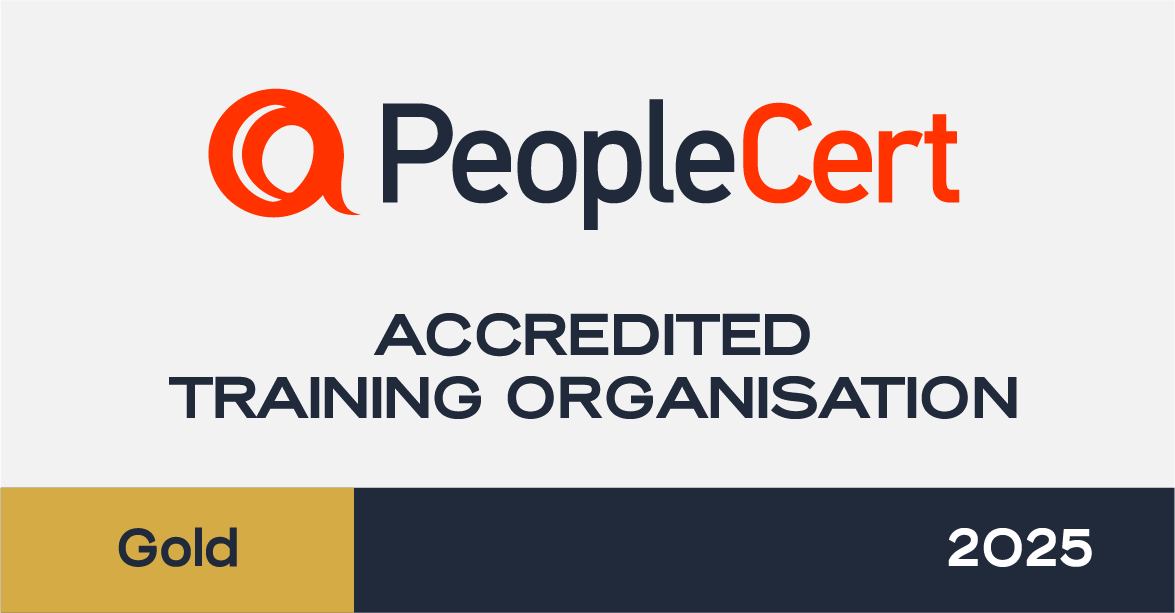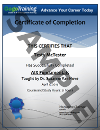Module 00: Course Introduction: ITIL® 4 Managing Professional Transition
- Agenda & Introductions
- Overview of the Transition Certification
- Transition Exam Details
- Materials to Support the Class
Module 01: Foundation
- Introduction
Module 02: Foundation: Key Definitions
- Key Definitions
- Service Offering
- Service Relationship Management
- Service Provision
- Service Consumption
Module 03: Foundation: Dimensions of Service Management
- Dimensions of Service Management
- Organizations & People
- Information & Technology
- Partners & Suppliers
- Value Streams & Processes
Module 04: Foundation: Service Value System (SVS)
- Service Value System (SVS)
Module 05: Foundation: Service Value Chain (SVC)
- Service Value Chain (SVC)
Module 06: Foundation: Guiding Principles
- Focus on Value
- Start Where You Are
- Progress Iteratively with Feedback
- Collaborate and Promote Visibility
- Think and Work Holistically
- Keep it Simple and Practical
- Optimize and Automate
Module 07: Foundation Summary
- Foundation Summary
- Foundation Sample Questions
- Foundation Exercise: ITIL4 MPT – Foundation Review v1
Module 08: Direct, Plan & Improve
- Scope and Strategic Planning
- Cascading Objectives
Module 09: Direct, Plan & Improve: Policies, Controls and Guidelines
- Policies, Controls and Guidelines
- Compliance and Decision-Making Authorities
Module 10: DPI: Governance, Risk and Compliance
- Risk Management and Governance
- Governance and DPI
Module 11: DPI: Organizational Change Management
- Organizational Change Management (OCM)
- Impact of OCM and DPI
- Managing Stakeholders
Module 12: DPI: Effective Communication
- All About Communication
- Feedback Channels
Module 13: DPI Summary
- DPI Summary
- DPI Sample Exam Questions
- DPI Exercise
Module 14: Create, Deliver & Support
- Organizational Structures
- Collaboration vs. Cooperation
- Team Competencies
Module 15: CDS: Team Culture & Differences
- Team Culture & Differences
Module 16: CDS: Employee Satisfaction Management
- Employee Satisfaction
- Customer-Orientation
- Communication
- Workforce Planning
Module 17: CDS: Results-Based Measuring & Reporting
- Measuring and Reporting
- Continual Improvement
Module 18: CDS: Know How Practices Contribute
- Service Value Streams
- Designing Service Value Streams
- Value Stream Mapping
- Metrics for Value Streams
Module 19: CDS: The Value Stream for a New Service
- Value Streams for a New Service
Module 20: CDS: The Value Stream for User Support
- Value Stream for User Support
Module 21: CDS: Know How to Create, Deliver & Support
- Managing Queues and Backlogs
- Prioritizing Work
- Shift-left
- Sourcing
Module 22: CDS Summary
- CDS Summary
- CDS Sample Exam Questions
- CDS Exercise
Module 23: Drive Stakeholder Value
- Customer Journey
- Benefits
Module 24: DSV: Explore to Engage
- Mutual Readiness
- Managing Suppliers & Partners
- Service Relationship Types
- Building Service Relationships (Three C’s of Trustworthiness)
- Service Provider Capabilities and Customer Needs
Module 25: DSV: Shape, Demand and Define Service Offerings
- Design Digital Service Experiences – Lean
- Design Digital Service Experiences – Agile
- Service Design Thinking and Service Blueprinting
Module 26: DSV: Designing Digital Service Experiences
- Design for Onboarding
- Selling and Procuring
Module 27: DSV: Agree
- Onboarding and Offboarding Activities
- Relating with Users and Fostering Relationships
- User Engagement and Delivery Channels
Module 28: DSV: Onboard
- Enabling Users for Service
- Elevating Mutual Capabilities
- Offboarding
Module 29: DSV: Co-Create
- Ongoing Service Interactions
- Service Requests
- Moments of Truth & Intelligent Disobedience
Module 30: DSV: User Communities
- User Communities and User Feedback
Module 31: DSV: Realize Value
- Service Value and Value Realization
- Tracking Performance, Outputs, and Outcomes
Module 32: DSV: The Customer Journey
- Evaluate and Improve the Customer Journey
- Continual Improvement
- Charging and Billing
Module 33: DSV Summary
- DSV Summary
- DSV Sample Exam Questions
- DSV Exercise
Module 34: High Velocity IT
- HVIT Terms
- Digital Transformation
Module 35: HVIT: Objectives
- Valuable Investments
- Fast Development, Resilient Operations
- Value Co-creation; Assured Conformance
Module 36: HVIT: ITIL 4 and the Digital Product Lifecycle
- Four Dimensions
- PESTLE
- Service Value System
Module 37: HVIT: Service Value Chain
- Service Value Chain
- SVC and the Consumer
- SVC and Value Streams
- Digital Product Lifecycle
Module 38: HVIT: Fundamental Concepts for Delivering HVIT
- Five behaviors for HVIT
- Principles, Models and Concepts
- Purpose, People, Process
- Purpose: Ethics; Design Thinking
Module 39: HVIT: Safety Culture
- People: Safety Culture
- Progress: Complex Environments
Module 40: HVIT: Lean Culture
- Progress: Lean; Toyota Kata
- HVIT Approaches
- Lean, Agile, Resilient, Continuous
- Service Dominant Logic
Modules 41: HVIT Summary
- HVIT Summary
- HVIT Samples Exam Questions
- HVIT Exercise
Module 42: Managing Professional Transition Summary
- Summary Recap of Foundation, DPI, CDS, DSV, HVIT
- Full Sample Exam
You may take this course if you hold any of the below credentials which allows you to advance your career with 1 course and exam and save over $4,000 in ITIL 4 course and exam fees:
- ITIL V3 Experts
- Individuals with 17 or more ITIL V3 credits
- Individuals with 15 or more ITIL V3 Intermediate Credits and ITIL 4 Foundation Certification



